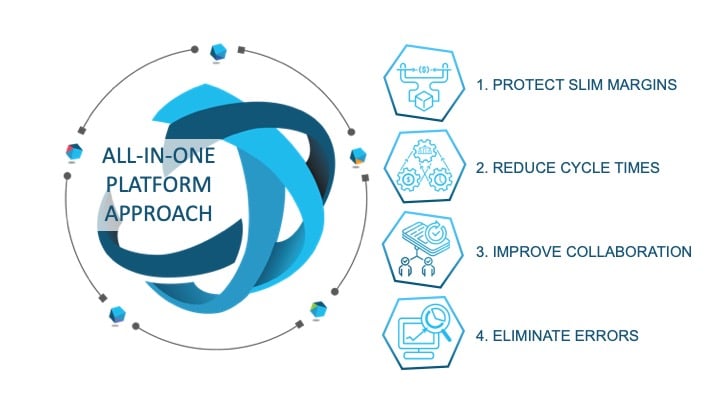During the past years, CRM has been a strategic initiative, and unfortunately often just a buzzword for companies to extend IT operations for their salespeople. In following this hype, companies often forget the real deal when deciding on their CRM vendor. Working with customers and prospects in the contract manufacturing and high-tech industry for years made me realize one thing: When it comes to this industry, a standard CRM system doesn't do the job. Although some of the big players in the market such as Salesforce.com, SAP Hybris or Microsoft Dynamics are suitable for some B2B verticals, for contract manufacturing and high-tech there is still a big gap between the offering and the real needs.
Where a standard CRM is a perfect match
As a sales manager, you should consider buying a standard CRM system when the characteristics of your (intended) sales process fall into the following buckets:
- You have sales reps on the road who are supposed to manage their sales activities in a system and you need to control that they are working on the right deals
- The system should help you to strategize about possible deals, track your opportunities and manage your pipeline
- Various functions from marketing, business development, sales, service, after-sales should be embedded in a stringent process. You also want to integrate social media marketing.
- You want to see the history of your accounts and contacts. You want to know what to “sell next”, upsell, cross-sell to the customer depending on past interactions and consult them to become more mature with your offerings.
In this case, a standard CRM helps you with a firework of features to track and monitor your sales team. You build up a customer database and can analyze best practice sales approaches by the data entered in the system.
A standard CRM is a perfect match when you push your products into the market in a B2B environment.
What's the deal with Omni-Channel CRM?
Lately, we have been observing movements in the CRM market where sales force automation even resorts to a webshop base for omnichannel services to the customers. This is great when your industry has the following characteristics:
- Customers have knowledge about the products you sell. They want to access them in a self-service manner and browse through your shop in an Amazon-like fashion.
- You want to communicate to the customer in a consistent and excellent experience via various channels.
- You are highly focused on-brand messaging.
Omni-Channel CRM provides consistent messaging.
As a result, standard CRM and Omnichannel solutions are a good fit when you sell one final product or services ranging in a B2B market and have proper branding and marketing. But do those characteristics also apply to your sales process when you are in contract manufacturing or high-tech industry?
The crux of contract manufacturing and high-tech industries
Having experienced many customer projects in contract manufacturing and high-tech, I observed the following:
- High dependency on the OEM (Original Equipment Manufacturer):
The market pull comes from the customer, the OEM. Whenever they need manufacturing services, they would ask for a Request for Proposals (RFPs) from the manufacturer. Hence, there are no options for sales reps to push products into the market. - Volatile business:
The economy runs in cycles everywhere in the world. However, being a lower tier in the supply chain makes business even more volatile, and planning becomes harder. - Pressure on margins:
Bigger OEM players, who want their products to be manufactured at reasonable costs but still request high quality, but high pressure on already low margins. We can observe this, especially in Asia. - No classic pipeline:
With the dependency on the OEM, there is no classic sales pipeline structure, as for example campaigns delivering prospects which will then turn into leads being qualified into opportunities, who will then be quoted to.
This business is rather about winning the bidding process of the RFQs (Request for Quotations) that are initiated by the OEMs. Also, there are no cross-sell or up-sell options, as a contract manufacturer offers the service to build products for an OEM, and there is no suite of products to be offered. In summary, you could say that “Contract manufacturing is a difficult, competitive, low-margin business.” where you can’t just push your products to the market. Rather isn’t your sales team busy receiving Request for Quotations (RFQs) which contain a complex Bill of Material (BOM) structure, drawings, and other specs explaining in detail how the components should be produced as devised by the OEM? There is high competition amongst contract manufacturers resulting in the OEM being price sensitive. Aiming to improve your sales process as a contract manufacturer or precision engineering company, your focus needs to be on the most labor-intensive step of the sales process which is the creation of the Request for Proposal.
Overtake your competition - It´s all about the quote
The above-mentioned characteristics show that in the contract manufacturing and high-tech industry different challenges need to be tackled to achieve a competitive advantage in the sales process.
- Protect your slim margins to operate a profitable business: Accurate costing is essential for that as the investment for each fixed cost such as tooling or new machines needs to be amortized in the product.
- Reduce the cycle time to create quotes: Quote cycle times are often too long to meet the aggressive requirements from the OEMs.
- Improve the collaboration between various departments, e.g. engineering and purchasing, which are needed for the detailed costing calculations. This collaboration can even involve several plants around the globe.
- Reduce quote errors: The RFQ process is highly prone to errors and inefficient when Excel files including product details and costs are shared amongst the collaborating parties. Efficient parallel work is hard to achieve as participants might depend on each other.

Experiencing these challenges and comparing them to the business scenario that standard CRMs are aiming to support, you can certainly confirm that there is a significant gap.
Simple but specialized - Cloud CRM for contract manufacturing and high-tech
But how can you fill that gap without disrupting your sales process by using numerous tools? You should have a look at specialized CRM systems for your vertical with emphasis on what cures your biggest pain points. Detailed costing and quotation engine should be at the system's heart. Enabling simulation on changes of cost parameters and building scenario analysis can be a game-changer for your business.
My advice is to get started with a database for your RFPs in order to analyze and continuously improve your sales operations. Considering the importance of collaboration, you need to empower your quote contributing parties with relevant data access, keeping in mind that different roles need different views on the data to work efficiently but still compliant. However, there are certain features a standard CRM offers that you shouldn’t be missing such as:
a) Basic Account and Contact Management
b) Lean Opportunity Management
c) Quotation Management
d) Analytics for Sales Insights
More requirements and analytics myths
Next to enabling a quick on-boarding and avoiding the disruption of your existing process, a sales system should fulfill the following requirements as well:
- Easy-to-use costing system to enable fast quote creation
- Enable upload and download of data from Excel sheets
- Ability to integrate to ERP systems such as SAP ERP in order to extract quote relevant data. Furthermore, a sales order creation integration can be a time-saving and accuracy delivering factor.
When it comes to analytics, a standard CRM usually comes with huge reporting capabilities with a focus on:
- your pipeline,
- different regions,
- different product lines
- or the personal sales performance for your quota and budgeting.
Considering that you operate in a business with slim margins, your focus should rather be on analyzing those for different customers and successful quotes. These analytics will provide insights on how to better protect your margins by certain markups while retaining a higher chance of success for your RFQs. Yet, with a specialized CRM system, you want to make the move to gain transparency on the RFQs created, and also get a notion of the chance of success with certain customers to focus selling time efficiently.
Summary
Supporting the sales force with CRM functionalities and hence improving the whole sales process is a step even contract manufacturers or high-tech businesses with a strong existing customer base won't be able to avoid much longer. Slim margins and a tight economy force these businesses into automating at least parts of their sales process in order to keep pace with their competitors. Aiming to shape your sales force, you should pick a system you want to invest in carefully as a standard CRM is not built for your needs.
Solve your toughest sales challenges with a digital sales platform built for manufacturing. Download our new guide, "Accelerate Manufacturing Sales" to find out how!

 Deutsch
Deutsch








